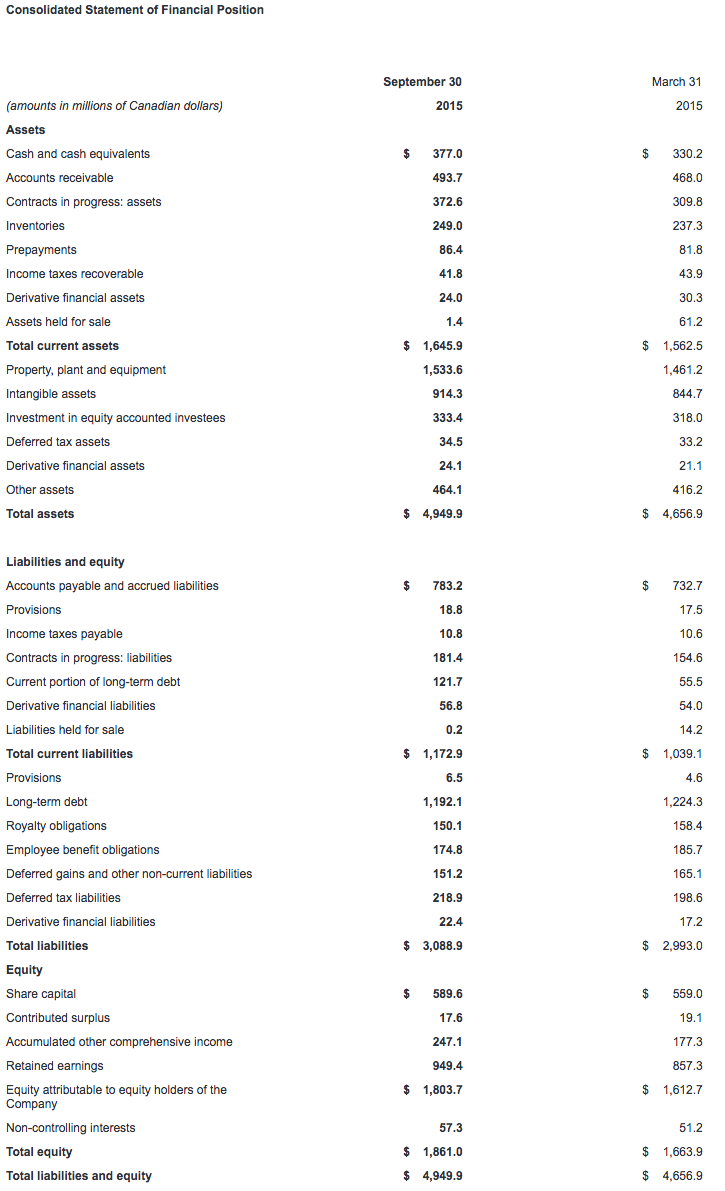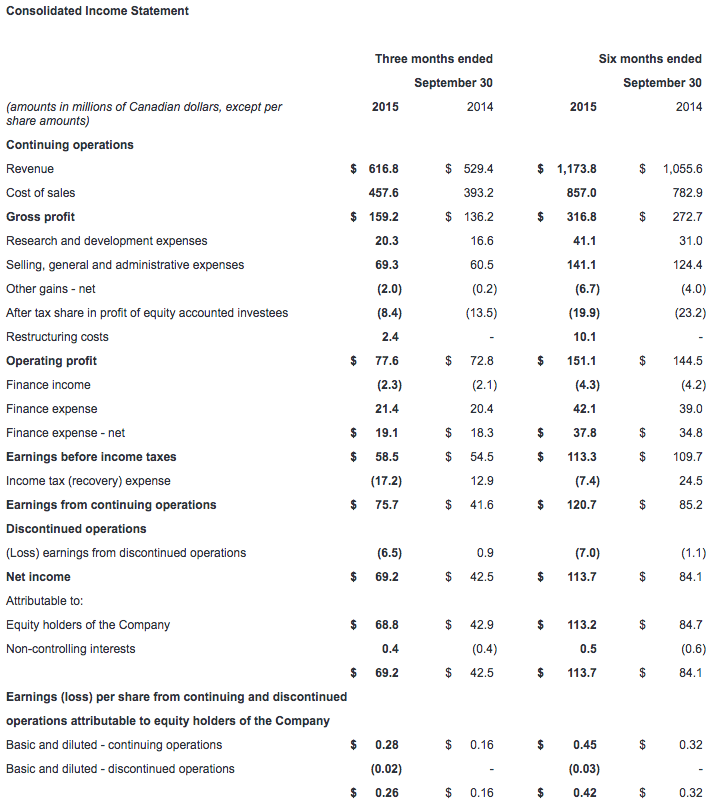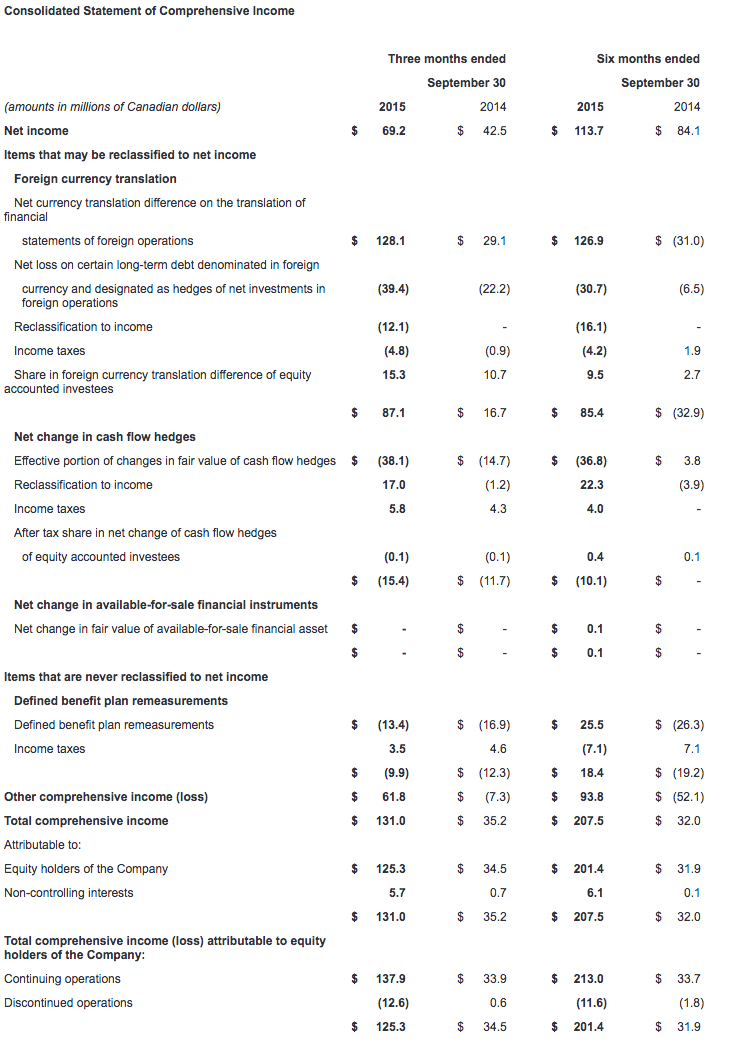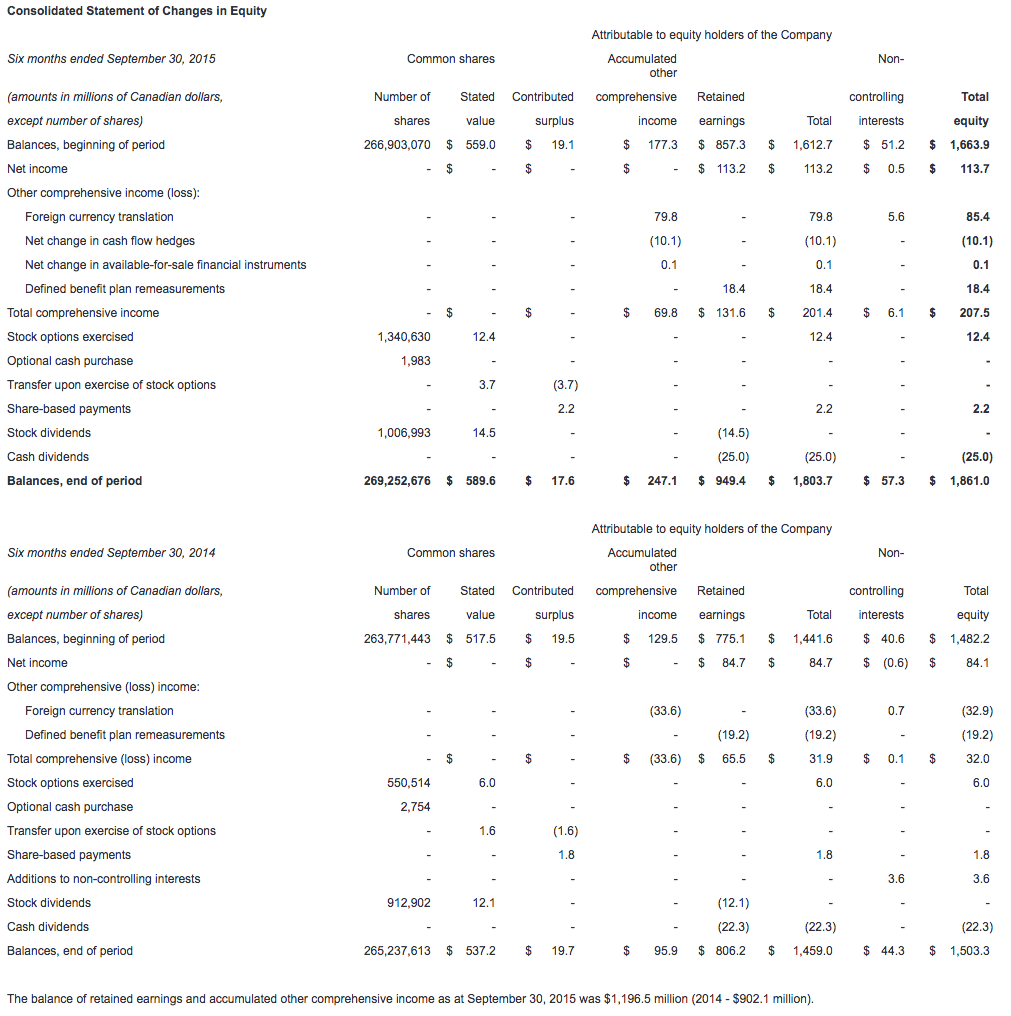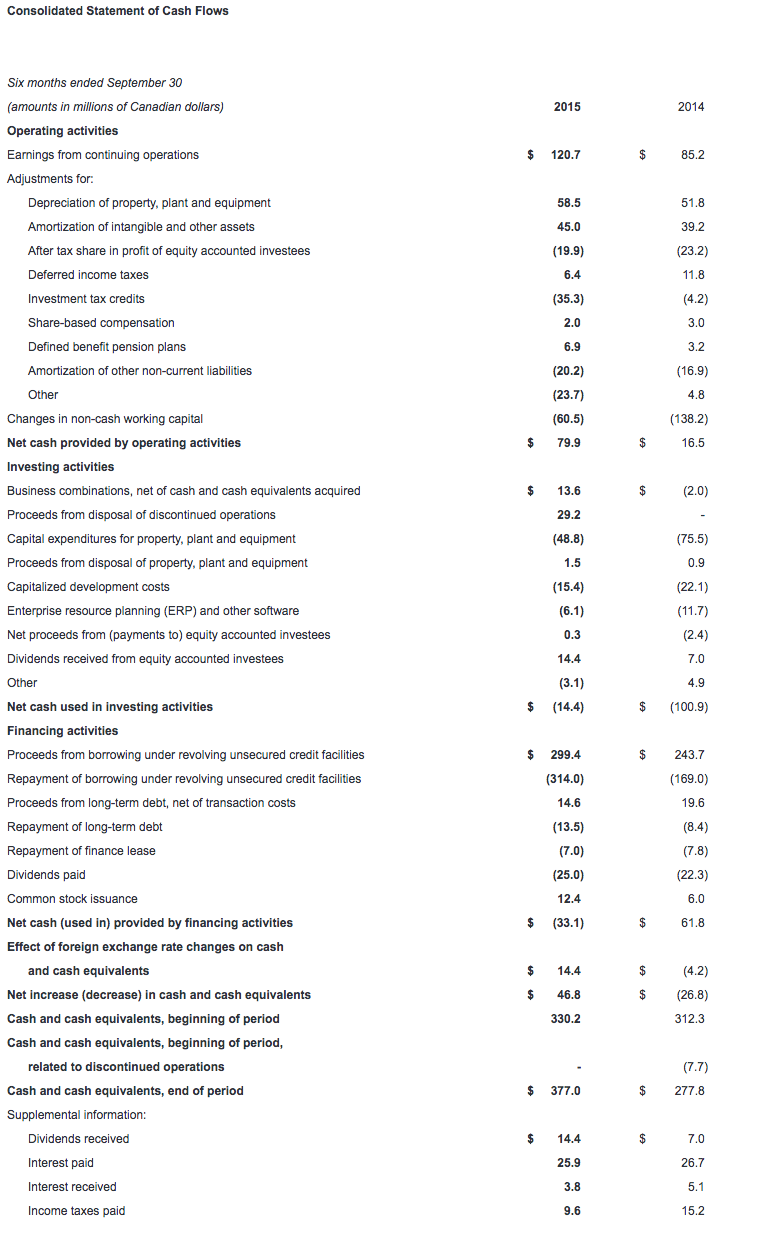

Revenue of $616.8 million vs. $529.4 million in prior year
EPS from continuing operations of $0.28 ($0.18 before specific items(1)) vs. $0.16 in prior year
Book-to sales(2) of 1.34x
Record order backlog(3) of $6.4 billion
CAE today reported revenue of $616.8 million for the second quarter of fiscal year 2016, representing a 17% increase over the second quarter last year. Second quarter net income attributable to equity holders from continuing operations was $75.3 million ($0.28 per share) vs. $42.0 million ($0.16 per share) last year.
Second quarter net income before specific items(4) was $47.7 million ($0.18 per share), up 14% from the same period last year. Specific items in the second quarter included $1.8 million (net after-tax) restructuring costs related to the process improvement program underway and a $29.4 million one-time tax item. All financial information is in Canadian dollars.
"I am pleased with our solid growth this quarter and the market's receptivity to our innovative training solutions. We experienced a high level of order activity which enabled us to reach a new record $6.4 billion order backlog," said Marc Parent, CAE's President and Chief Executive Officer. "In Civil, we generated double-digit growth in operating income over last year and we maintained our leading market position. In Defence, we also had double-digit income growth and orders exceeded revenue for the third quarter in a row, affirming our recently renewed outlook for growth. Our progress in the second quarter positions us well to meet our positive outlook for the fiscal year."
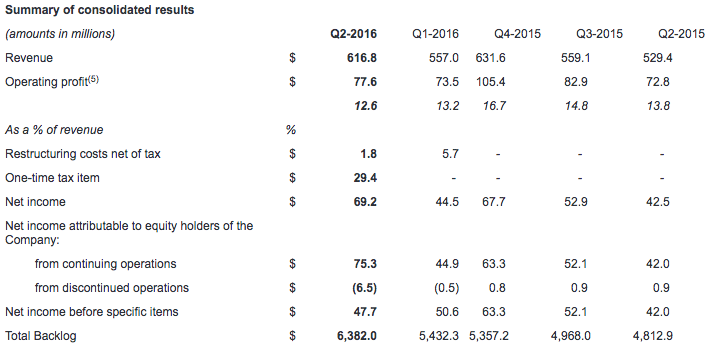
Civil Aviation Training Solutions (Civil)
Second quarter Civil revenue was $365.2 million, up 23% compared to the same quarter last year. Second quarter segment operating income(6) was $50.1 million (13.7% of revenue), up 10% compared to the second quarter last year. Training centre utilization rate(7) was 64% for the quarter.
During the quarter Civil signed a series of training solutions contracts spanning the broad range of CAE's capabilities, including the sale of 16 full-flight simulators (FFSs) and training programs with airlines and aircraft operators valued at $481.9 million. These solutions address the entire career life cycle of professional pilots, from cadet to captain training, and also include cabin crew training, aviation personnel resourcing, training centre operations and post-delivery services. Examples include the sale of two Boeing 737 MAX FFSs to Air Canada, an A320 FFS sale to Airbus, a long-term services renewal with JetBlue Airways, and a new exclusive long-term pilot training contract with Eastern Air Lines. The Civil book-to-sales ratio was 1.32x for the quarter and 1.16x for the last 12 months. The second quarter Civil backlog reached a record $3.0 billion.

Defence and Security (Defence)
Revenue for Defence in the second quarter was $226.2 million, up 8% compared to the second quarter last year. Second quarter segment operating income was $28.4 million (12.6% of revenue), up 11% compared to the second quarter last year.
During the quarter, Defence signed notable contracts involving enduring platforms, including the U.S. Navy's MH-60 Seahawk helicopter simulators and training systems, and a C-130J/LM-100J weapon systems trainer for Lockheed Martin. Defence also recorded orders involving integrated training systems with contract options exercised for a range of long-term training services programs including the U.S. Air Force MQ-1 Predator and MQ-9 Reaper, the U.S. Air Force KC-135 and the U.S. Navy T-44C, as well as service support for the German Air Force's Eurofighter simulators. Defence also concluded the acquisition of Bombardier's Military Aviation Training (BMAT) business, with integration currently underway. This makes CAE the prime contractor responsible for the NATO Flying Training in Canada (NFTC) program that produces qualified military fighter pilots for defence customers. In total, Defence received $318.8 million in orders this quarter, representing a book-to-sales ratio of 1.41x. The ratio for the last 12 months was 1.10x. Second quarter Defence backlog reached a record level $2.9 billion and was further augmented to $3.4 billion with the inclusion of backlog from the BMAT acquisition.

Healthcare
Revenue for Healthcare was $25.4 million in the second quarter, compared to $24.3 million last year. Second quarter segment operating income was $1.5 million (5.9% of revenue), compared to $1.8 million last year (7.4% of revenue).
During the quarter, CAE Healthcare sold products and services from its broad suite of solutions to healthcare providers, universities, emergency medical services, and defence forces worldwide. Highlights include a contract for a comprehensive suite of simulator and centre management solutions for the McGill University Health Centre to be used for research at the Centre for Innovative Medicine. As well, CAE Healthcare sold customized interventional simulators to medical device manufacturer, Abiomed, to train catheterization laboratory teams to use its Impella® heart pump. CAE Healthcare partnered with a key scientific society, the International Nursing Association for Clinical Simulation & Learning (INACSL), and together introduced the INACSL-CAE Healthcare Simulation Fellowship program for healthcare educators and professionals.

Additional financial highlights
Free cash flow(9) from continuing operations was positive $101.7 million in the second quarter compared to negative $17.1 million in the second quarter last year. The increase was mainly due to a lower investment in non-cash working capital(10). Net cash provided by continuing operating activities and net cash used in investing activities was positive $65.5 million, compared to negative $84.4 million in the prior year.
Income tax recovery this quarter of $17.2 million was mainly attributable to the favourable settlement of tax oppositions in Canada with respect to the tax treatment of the sale of certain simulators, partially offset by the negative impact of certain tax audits. Excluding the effect of one-time items in the quarter, the income tax expense would have been $12.2 million, for an income tax rate of 21%. This compares to 24% for the second quarter last year. The lower rate is mainly due to a change in the mix of income from various jurisdictions.
Growth and maintenance capital expenditures(11) totaled $25.2 million for the quarter compared to $35.8 million in the second quarter last year.
Net debt(12) ended at $936.8 million this quarter, compared to $1,006.8 million last quarter. CAE's net debt-to-total capital(13) ratio was lower at 33.5% compared to last quarter.
Return on capital employed(14) (ROCE) was 11% this quarter, compared to 10.3% last quarter and 10.7% for the second quarter last year.
CAE will pay a dividend of 7.5 cents per share effective December 31, 2015 to shareholders of record at the close of business on December 15, 2015.
Management outlook for fiscal 2016
CAE continues to expect growth in fiscal 2016 across all business segments, with a stronger second half of the fiscal year compared with the first half, owing mainly to the seasonality inherent to certain parts of its business. In Civil, the Company expects double-digit annual operating income growth and an improvement in operating margins from the 16.3% level reached last year, driven mainly by higher training utilization. CAE also expects to have Civil FFS unit sales similar to the number it reached in fiscal 2015. In Defence, CAE expects modest growth with operating margins in the 12-13% range. CAE continues to anticipate higher annual returns on capital employed going forward as it fills training centre capacity, undertakes a greater share of its customers' training activities, brings its process improvement plan to fruition, and incrementally invests in accretive, customer-driven growth opportunities.
Detailed information
Readers are strongly advised to view a more detailed discussion of our results by segment in the Management's Discussion and Analysis (MD&A) and CAE's consolidated interim financial statements which are posted on our website at www.cae.com/investors.
CAE's consolidated interim financial statements and management's discussion and analysis for the quarter ended September 30, 2015 have been filed with the Canadian Securities Administrators on SEDAR (www.sedar.com) and are available on our website (www.cae.com). They have also been filed with the U.S. Securities and Exchange Commission and are available on their website (www.sec.gov).
Conference call Q2 FY2016
CAE President and CEO, Marc Parent; Stephane Lefebvre, Vice President, Finance, and CFO; and Andrew Arnovitz, Vice President, Strategy and Investor Relations will conduct an earnings conference call today at 1:00 p.m. ET. The call is intended for analysts, institutional investors and the media. Participants can listen to the conference by dialling + 1 877 586 3392 or +1 416 981 9024. The conference call will also be audio webcast live for the public at www.cae.com.
CAE is a global leader in the delivery of training for the civil aviation, defence and security, and healthcare markets. We design and integrate the industry's most comprehensive training solutions, anchored by the knowledge and expertise of our 8,000 employees, our world-leading simulation technologies and a track record of service and technology innovation spanning nearly seven decades. Our global presence is the broadest in the industry, with 160 sites and training locations in 35 countries, including our joint venture operations, and the world's largest installed base of flight simulators. Each year, we train more than 120,000 civil and defence crewmembers, as well as thousands of healthcare professionals worldwide.
Caution concerning limitations of summary earnings press release
This summary earnings press release contains limited information meant to assist the reader in assessing CAE's performance but it is not a suitable source of information for readers who are unfamiliar with CAE and is not in any way a substitute for the Company's financial statements, notes to the financial statements, and MD&A reports.
Caution concerning forward-looking statements
Certain statements made in this news release are forward-looking statements. These statements include, without limitation, statements relating to our fiscal 2016 financial guidance (including revenues, capital investment and margins) and other statements that are not historical facts. Forward-looking statements are typically identified by future or conditional verbs such as anticipate, believe, expect, and may. All such forward-looking statements are made pursuant to the 'safe harbour' provisions of applicable Canadian securities laws and of the United States Private Securities Litigation Reform Act of 1995. Forward-looking statements, by their very nature, are subject to inherent risks and uncertainties and are based on several assumptions, both general and specific, which give rise to the possibility that actual results or events could differ materially from our expectations expressed in or implied by such forward-looking statements and that our business outlook, objectives, plans and strategic priorities may not be achieved. As a result, we cannot guarantee that any forward-looking statement will materialize and we caution you against relying on any of these forward-looking statements. The forward-looking statements contained in this news release describe our expectations as of November 11, 2015 and, accordingly, are subject to change after such date. Except as may be required by Canadian securities laws, we do not undertake any obligation to update or revise any forward-looking statements contained in this news release, whether as a result of new information, future events or otherwise. Except as otherwise indicated by CAE, forward-looking statements do not reflect the potential impact of any special items or of any dispositions, monetizations, mergers, acquisitions, other business combinations or other transactions that may occur after November 11, 2015. The financial impact of these transactions and special items can be complex and depends on the facts particular to each of them. We therefore cannot describe the expected impact in a meaningful way or in the same way we present known risks affecting our business. Forward-looking statements are presented in this news release for the purpose of assisting investors and others in understanding certain key elements of our expected fiscal 2016 financial results and in obtaining a better understanding of our anticipated operating environment. Readers are cautioned that such information may not be appropriate for other purposes. The value of capital investments expected to be made by CAE in FY2016 assumes that capital investments will be made in accordance with our current annual plan. However, there can be no assurance that such investment levels will be maintained with the result that the value of actual capital investments made by CAE during such period could materially differ from current expectations.
Material assumptions
A number of economic, market, operational and financial assumptions were made by CAE in preparing its forward-looking statements for fiscal 2016 contained in this news release, including, but not limited to certain economic and market assumptions including: modest economic growth and interest rates to remain largely unchanged in fiscal 2016; a sustained level of competition in civil, defence & healthcare markets; no material financial, operational or competitive consequences of changes in regulations affecting our business; and a relatively stable defence market.
Assumptions concerning our businesses
A number of assumptions concerning CAE's business were also made in the preparation of its forward-looking statements for fiscal 2016 contained in this news release, including, but not limited to factors including: productivity and efficiency gains to lower CAE's manufacturing costs and cycle times; maintenance of CAE's market share in civil simulator sales in the face of price competition from recent market entrants; higher Civil training network utilization; and lower total capital expenditure requirements.
The foregoing assumptions, although considered reasonable by CAE on November 11, 2015, may prove to be inaccurate. Accordingly, our actual results could differ materially from our expectations as set forth in this news release.
Material risks
Important risk factors that could cause our assumptions and estimates to be inaccurate and actual results or events to differ materially from those expressed in or implied by our forward-looking statements, including our fiscal 2016 financial guidance, are set out in CAE's 2015 Annual MD&A (included in the CAE 2015 Annual Report) filed by CAE with the Canadian Securities Administrators (available at www.sedar.com) and with the U.S. Securities and Exchange Commission (available at www.sec.gov). These documents are also available at cae.com. The realization of our forward-looking statements, including our ability to meet our fiscal 2016 outlook, essentially depends on our business performance which, in turn, is subject to many risks. Accordingly, readers are cautioned that any of the disclosed risks could have a material adverse effect on our forward-looking statements. We caution that the disclosed list of risk factors is not exhaustive and other factors could also adversely affect our results.
Non-GAAP and other financial measures
This press release includes non-GAAP and other financial measures. Non-GAAP measures are useful supplemental information but may not have a standardized meaning according to GAAP. These measures should not be confused with, or used as an alternative for, performance measures calculated according to GAAP. They should also not be used to compare with similar measures from other companies. Management believes that providing certain non-GAAP measures provides users with a better understanding of our results and trends and provides additional information on our financial and operating performance.
(1) Earnings per share before specific items is a non-GAAP measure calculated by excluding the effect of restructuring costs and one-time tax items from the diluted earnings per share from continuing operations attributable to equity holders of the Company. The effect per share is obtained by dividing restructuring costs, net of tax, and one-time tax items by the average number of diluted shares. We track it because we believe it provides a better indication of our operating performance on a per share basis and makes it easier to compare across reporting periods.
(2) The book-to-sales ratio is the total orders divided by total revenue in the period.
(3) Total backlog is non-GAAP measure that includes obligated backlog, joint venture backlog and unfunded backlog. Obligated backlog represents the expected value of orders we have received but have not yet executed. Joint venture backlog is obligated backlog that represents the expected value of our share of orders that our joint ventures have received but have not yet executed. Unfunded backlog represents firm Defence and Security orders we have received but have not yet executed and for which funding authorization has not yet been obtained. We include unexercised negotiated options which we view as having a high probability of being exercised, but exclude indefinite-delivery/indefinite-quantity (IDIQ) contracts.
(4) Net income before specific items is a non-GAAP measure we use as an alternate view of our operating results. We calculate it by taking our net income attributable to equity holders of the Company from continuing operations and adding back restructuring costs, net of tax, and one-time tax items. We track it because we believe it provides a better indication of our operating performance and makes it easier to compare across reporting periods.
(5) Operating profit is non-GAAP measure that shows us how we have performed before the effects of certain financing decisions, tax structures and discontinued operations. We track it because we believe it makes it easier to compare our performance with previous periods, and with companies and industries that do not have the same capital structure or tax laws.
(6) Segment operating income (SOI) is a non-GAAP measure and our key indicator of each segment's financial performance. This measure gives us a good indication of the profitability of each segment because it does not include the impact of any items not specifically related to the segment's performance. We calculate it by taking the operating profit and excluding the impact of restructuring costs.
(7) Utilization rate is an operating measure we use to assess the performance of our simulator training network. We calculate it by taking the number of training hours sold on our simulators during the period divided by the practical training capacity available for the same period.
(8) Simulator equivalent unit (SEU) is an operating measure we use to show the total average number of FFSs available to generate earnings during the period.
(9) Free cash flow is a non-GAAP measure that shows us how much cash we have available to invest in growth opportunities, repay debt and meet ongoing financial obligations. We use it as an indicator of our financial strength and liquidity. We calculate it by taking the net cash generated by our continuing operating activities, subtracting maintenance capital expenditures, investment in other assets not related to growth and dividends paid and adding proceeds from the disposal of property, plant and equipment, dividends received from equity accounted investees and proceeds, net of payments, from equity accounted investees.
(10) Non-cash working capital is a non-GAAP measure we use to monitor how much money we have committed in the day-to-day operation of our business. We calculate it by taking current assets (not including cash and cash equivalents and assets held for sale) and subtracting current liabilities (not including the current portion of long-term debt and liabilities held for sale).
(11) Maintenance capital expenditure is a non-GAAP measure we use to calculate the investment needed to sustain the current level of economic activity. Growth capital expenditure is a non-GAAP measure we use to calculate the investment needed to increase the current level of economic activity.
(12) Net debt is a non-GAAP measure we use to monitor how much debt we have after taking into account liquid assets such as cash and cash equivalents. We use it as an indicator of our overall financial position, and calculate it by taking our total long-term debt, including the current portion of long-term debt, and subtracting cash and cash equivalents.
(13) Net debt-to-capital is calculated as net debt divided by the sum of total equity plus net debt.
(14) Return on capital employed (ROCE) is a non-GAAP measure we use to evaluate the profitability of our invested capital. We calculate this ratio over a rolling four-quarter period by taking net income attributable to equity holders of the Company excluding net finance expense, after tax, divided by the average capital employed.
For a detailed reconciliation of these measures as well as other non-GAAP and other financial measures monitored by CAE, please refer to CAE's Management's Discussion and Analysis filed with the Canadian Securities Administrators available on our website (www.cae.com) and on SEDAR (www.sedar.com).
Contacts
Investor Relations:
Andrew Arnovitz, Vice President, Strategy and Investor Relations 1-514-734-5760, [email protected]
Media:
Hélène V. Gagnon, Vice President, Public Affairs and Global Communications 1-514-340-5536, [email protected]
